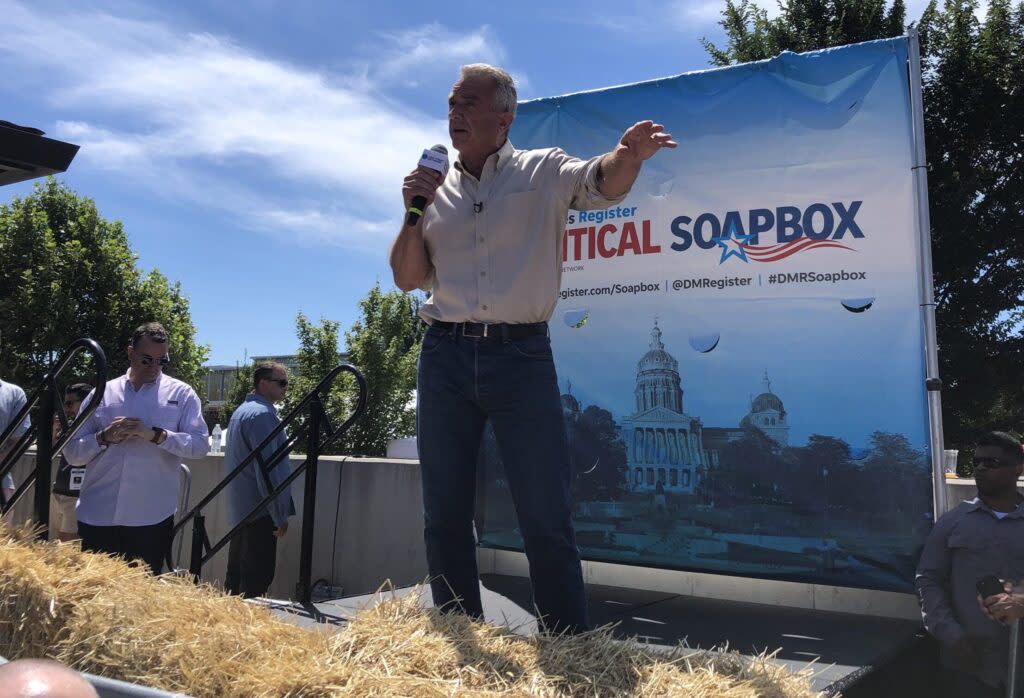Nebraska Democratic Party seeks to block RFK Jr. from fall ballot

- Oops!Something went wrong.Please try again later.
Presidential candidate Robert F. Kennedy, Jr. takes the stage at the Des Moines Register soapbox Aug. 12, 2023. (Jay Waagmeester/Iowa Capital Dispatch)
LINCOLN — The Nebraska Democratic Party filed an objection this week seeking to block Robert F. Kennedy Jr. from appearing as a nonpartisan candidate for president on the state’s fall ballot.
In a Tuesday filing, the party said Kennedy’s ticket “does not satisfy the statutory requirements to form a nonpartisan ticket.” The party cites two reasons for its challenge: that Kennedy had been a registered Democrat as of March 1 and that the “overall strategy” of the campaign has been to seek ballot access “through whichever method they perceive to be the easiest.”
“Under Nebraska law, a truly nonpartisan candidate may bypass the primary election and still appear on the ballot for the general election,” the challenge reads. “State law is clear on the requirements for the offices of President and Vice President, in particular.”
In Nebraska, “nonpartisan” is a catchall label for any voter without affiliation to one of five recognized political parties. As of July 1, 22% of Nebraska voters were registered “nonpartisan.”
The Nebraska Democratic Party’s filing was submitted by Alexander S. Arkfeld, the party’s counsel, on behalf of Jane Kleeb, state party chair.
Partisan in some states. nonpartisan in others
One of the Democratic Party’s key complaints is Kennedy’s efforts to appear in some states as a nonpartisan candidate while pursuing a partisan label in others.
In Hawaii and North Carolina, his campaign established a new party — the “We the People Party.”
Elsewhere, Kennedy’s campaign has sought access through the Libertarian Party of Colorado, the American Independent Party of California, Independent Party of Delaware, Reform Party in Florida, Natural Law Party in Michigan and Alliance Party in South Carolina.
“Even a cursory review of these political parties’ platforms reveals distinct and conflicting ideologies,” the challenge states. “Accordingly, the Kennedy campaign is attempting to evade Nebraska’s Election Act.”
Kennedy’s running mate is Nicole A. Shanahan, who said in mid-March she would also leave the Democratic Party to join Kennedy’s ticket.
The challenge rests on a handful of state laws, including one outlining that any registered voter who was not a candidate in the primary and who wasn’t registered with a party affiliation on or after March 1 could pursue a petition campaign for a partisan office that fall.
Pathway for independent candidate
A second law, which applies only to presidential and vice presidential candidates, says candidates “of nonpartisan status” must file with the Nebraska Secretary of State an application and petition, signed by at least 2,500 registered voters, by Aug. 1 in a presidential election year. If valid, that ticket could appear on the presidential ballot.
Online, at the bottom of that law, is an annotation stating it is unconstitutional as it relates to independent presidential and vice presidential candidates. That’s because of a 1977 court case that started in Nebraska and went to the 8th U.S. Circuit Court of Appeals: MacBride v. Exon.
“The state has a perfectly legitimate and compelling interest in requiring of a would-be candidate a showing, as by nominating petitions, that his candidacy is not frivolous, that he is truly an independent candidate and that his candidacy has a satisfactory level of popular support,” the court wrote in 1977.
At the time, the court determined there was no pathway for an independent onto Nebraska’s ballot, which has since been changed.
Kennedy submitted more than 5,000 signatures to Nebraska Secretary of State Bob Evnen’s office as part of that process last month.
The Nebraska Democratic Party filed a July 12 records request asking to review those signatures once they were available.
The MacBride decision is cited as a reason the state should determine its election processes, but the challenge doesn’t address petitions as a way to prove a candidate’s legitimacy.
However, the filing does seemingly push back on another state law that excludes the executive branch positions in the state’s definition of “candidate” in state laws.
“Kennedy and Shanahan are seeking to access Nebraska’s general election ballot as nonpartisan candidates pursuant to Section 32-620, which is the only statute available to them to do so,” the filing explains.
The Nebraska Democratic Party asked Evnen to render a decision “as soon as possible” while acknowledging Kennedy’s campaign “should be given an opportunity to respond.”
“We respectfully suggest that you set a seven-day deadline for the campaign to do so.”
GET THE MORNING HEADLINES DELIVERED TO YOUR INBOX
The post Nebraska Democratic Party seeks to block RFK Jr. from fall ballot appeared first on Nebraska Examiner.

